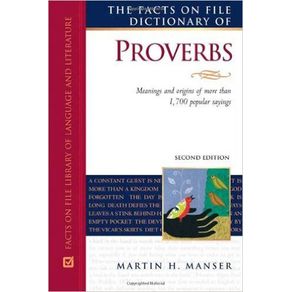A proverb is a saying, usually short, that expresses a general truth about life. Proverbs give advice, make an observation, or present a lesson in a succinct and memorable way. We use proverbs or allude to them often in everyday speech. Some examples of proverbs include: Better safe than sorry; The grass is always greener on the other side of the fence; If at first you don't succeed, try, try again. ""The Facts On File Dictionary of Proverbs, Second Edition"" includes more than 1,700 English-language proverbs - with 200 new - that are widely recognized today. Arranged alphabetically, entries provide the meaning of each proverb, the date it was first recorded, variant forms of the proverb, other proverbs that are similar and opposite to it in meaning, and examples of the proverbs used. This fascinating dictionary will provide readers and students with insight into this unique aspect of our language. This new edition has been expanded to include more familiar, long-established proverbs (such as "Call a spade a spade"; "It takes one to know one"; and "Worse things happen at sea") as well as a selection of more modern ones (such as "You snooze, you lose" and "Men are from Mars, women are from Venus""). Existing entries have been updated to include modern variants (such as ""The e-mail of the species is more deadly than the mail,"" instead of ""The female of the species is deadlier than the male" and "The geek shall inherit the earth," a variant of "The meek shall inherit the earth""). Additional, all-new features include boxes containing selected lists of proverbs from other languages and cultures.



